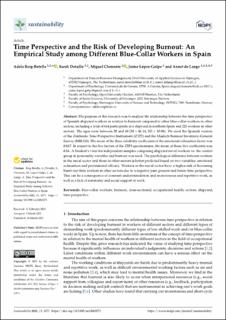Time perspective and the risk of developing burnout: An empirical study among different blue-collar workers in Spain
Peer reviewed, Journal article
Published version
Permanent lenke
https://hdl.handle.net/11250/2772387Utgivelsesdato
2021-03Metadata
Vis full innførselSamlinger
Originalversjon
Reig-Botella, A., Detaille, S., Clemente, M., et al. (2021). Time Perspective and the Risk of Developing Burnout: An Empirical Study among Different Blue-Collar Workers in Spain. Sustainability, 13(6), 3271 10.3390/su13063271Sammendrag
The purpose of this research was to analyze the relationship between the time perspective of Spanish shipyard workers in relation to burnout compared to other blue-collar workers in other sectors, including a total of 644 participants in a shipyard in northern Spain and 223 workers in other sectors. The ages were between 20 and 69 (M = 46.14, SD = 10.98). We used the Spanish version of the Zimbardo Time Perspective Instrument (ZTPI) and the Maslach Burnout Inventory–General Survey (MBI-GS). The mean of the three reliability coefficients of the emotional exhaustion factor was 0.887. In respect to the five factors of the ZTPI questionnaire, the mean of those five coefficients was 0.86. A Student’s t-test for independent samples comparing shipyard naval workers vs. the control group in personality variables and burnout was used. The psychological difference between workers in the naval sector and those in other sectors is better predicted based on two variables: emotional exhaustion and professional efficacy. Workers in the naval sector have a higher risk of becoming burnt-out than workers in other sectors due to a negative past, present and future time perspective. This can be a consequence of constant understimulation and monotonous and repetitive work, as well as a lack of autonomy and social support at work.

